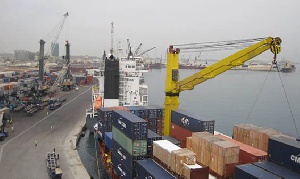The Tema Freight Forwarders Association has called for the suspension of the paperless transaction at Ghana’s sea ports for more education and sensitization to be done before implementation.
Mr. Mawuli Tettey, Spokesman of Tema Freight Forwarder Association, said this on Monday during a press conference organized by the Association to protest against the September 1st commencement of the paperless transaction which was to make business transactions at the ports completely electronic.
“We the freight forwarders at the port are saying that the paperless transactions must be suspended for the mean time. We say this because education on the policy was poorly managed. Yes, we support this policy, but the same people who will work with the policy were not duly informed on how to go about it when it is rolled out,” he said.
He observed that the paperless regime was good and would reduce the long time involved in processing their documents which will help the economy, but said they should do it in a way that would not kill the desire to fight delays and corruption in the system.
“We are appealing through this conference to the authorities to come to our aid immediately since it is our right to be educated on this new policy,” he said.
He said the education was on going for a section of the GPHA community leaving out the freight forwarders which will affect the implementation when it commenced.
Mr Paul Gborson, a Freight Forwarder, observed that there would be challenges with the implementation of the new policy.
He said, “The reason why they are introducing this was because they say some monies have been going into private pockets. The question we should ask ourselves is where do the containers pass before they get to the market.”
He informed that there were some corrupt practices that made it possible for people to steal from the system other than corruption caused by paper transactions, and therefore the need for an open forum to address the many questions they had on their minds.
Mr Samuel Okai, also a Freight Forwarder, claimed that the paperless transaction was already in place and that “this was only going to lay some workers off” adding “the freight forwarders are private agencies who want to make supper profits, so if you take an aspect from their work they would let people go home.”
He observed that whenever the media gave chance to people to talk on the issue or not, the representation was always limited to the state institutions.
“All you hear is customs officials saying they would not be affected because they understand the processes and have a way of realigning themselves to suit the new system. But freight forwarding agencies are owned by private agencies and they haven’t got much education on the policy,” he informed.
Business News of Wednesday, 30 August 2017
Source: ghananewsagency.org

















